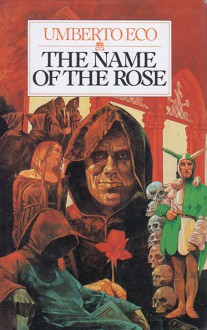Reviewed by clq on
The Name of the Rose is a 13th century murder mystery told in the voice of a monk writing about 7 days from his youth he would never forget. I don’t know that many 13th century monks, but from what I can tell, the tone and style of the book is incredibly well done. At first it is so well done that it becomes irritating, but after a few chapters it is hard to imagine the story being told in any other way. Even though the book has very few jokes, the tone leads to plenty of really funny moments as undignified moments are being told of in a “dignified” manner, as well as a handful of beautifully absurd “proper” descriptions of things that are anything but. The two main characters of the story, and at times the plot, seems to follow the tried and tested Sherlock Holmes formula, perhaps just a tad too shamelessly at times. Still, the plot is solid, engaging, and exciting.
Seeing as the story takes place in an abbey, and is told by a monk, discussions of a religious nature are to be expected. For the most part I found them rather fascinating. There are plenty of interesting thoughts on religion, morals, literature, knowledge, and different ways of handling, using, and interpreting all of these things. This will always be a balancing act. There should be enough philosophy to add to the story, but not as much as to bore the reader/detract from the flow. A few times The Name of the Rose falls of this tight-rope rather badly. There are places where, in my opinion, pages of discussion takes place that adds nothing to the story at all. I’m sure I’m probably missing something, but some places, especially where historical religious figures are discussed, the inclusion of the discussions seems a little forced. That said, on balance, I found the “philosophical stuff” to add much more than it detracted.
Overall I thought the book was good, but inconsistent. There are plenty of really fantastic moments. There are also plenty of moments that are… well, boring, but these are made up for by the good times. It’s not an easy read, it’s at times a frustrating read, but when all is said and done, I think it is a very worthwhile read.
Reading updates
- Started reading
- 1 February, 2014: Finished reading
- 1 February, 2014: Reviewed
